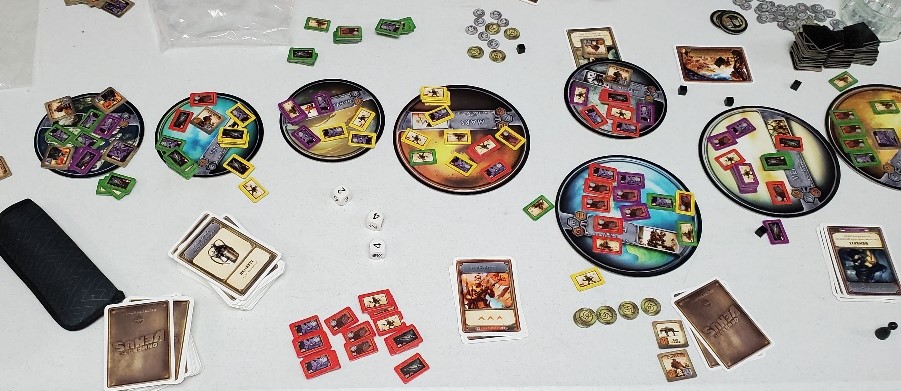The Games You Want to Play…Onward to Venus

The Russian Empire (Purple, Chuck), The British Empire (Red, Wil), America (Green, Tim), and the German Empire (Yellow, Jeff) fight for dominance of the Solar System in this H.G. Wells / Steampunk / Victorian-era themed game. The game is fairly simple to play with straight-forward combat and movement rules. The cards, with their fanciful weapons and eccentric characters, add real spice to the game and the combat.
Each planetary body is represented by a separate planet card and are setup in a row (with Luna adjacent to the Earth) in the order of Mercury, Venus, Earth/Moon, Mars, Ganymede (nothing interesting ever happens on Ganymede), Titan, and the Kuiper Belt. The players start in orbit around Earth and move out into the Solar System from there. Each planetary body has up to three victory point levels, which are earned by the empires based on their economic dominance of a planet (the most mines and factories). Players can earn victory points from Big Game Hunts and heading off Crises, also.
Each turn, chits are drawn randomly and placed on the various planetary bodies. Players can move their ships and troops (infantry and massive tanks/land ships) up and down the row of planets, dropping their units on planets to grab the mines, factories, extra cards, and hunting expeditions as represented by the various chits that are revealed. The chits also include Crises that, if they accumulate and are left unchecked, can lead to such events as a robotic uprising on Earth or an alien invasion originating from beyond the Kuiper Belt. Each planetary body has its own potential Crisis that grows worse as more Crises accumulate (except Ganymede where – well, see above…) The Earthlings can use their military forces to eliminate Crisis chits to keep things from growing out of hand, but that takes forces away from empire building. Another chit, Tension, allows the empires to fight each other, which can lead to sudden shifts in power on a planet.
The Russians struck first, dropping a major force on Earth to secure factories and mines. Unfortunately, they found they were not able to lift their forces back into orbit immediately (important note, unless you have a special card in your hand, units that land on a planet are there until the end of the turn when they return to orbit). They were followed by the British, who quickly secured the remaining mine resource and, taking advantage of the Tension chit on the planet, captured the American factory. Feeling stung, the Americans made for the extremities of the solar system, taking up orbits around Mercury and the Kuiper Belt. Germany was content to develop the middle and outer solar system spanning from Mars to Titan and leave the inner planets to others.
Russia then struck out for Venus and took early dominance there, only to have the British follow them and exert their dominance there as well. Russia and the British eventually took their rivalry to the moon, but the British managed to maintain the edge. Late in the effort, the Americans took advantage of Tension on Venus and launched an excursion to take the last remaining mine and tie for the resource lead with the British. This seemed to eliminate any opportunity for Russia to regain their dominance on the planet. However, in a surprise move, the Germans stoked tensions again on Venus, providing the opening the Russians needed to expel the American capitalists and regain their previous dominance of Venus.
With the Russians re-gaining dominance on Venus, the Americans found themselves with their strongholds on the closest Inner System and the furthest Outer System planetary bodies – Mercury and the Kuiper Belt. Unfortunately, they were having strange encounters out on the edge of the Solar System that began to make them nervous. The Russians maintained a strong presence on Venus, Earth, and the moon. The Germans had a strong presence on Mars, Ganymede, and Titan. The British, though strong on the Earth and the moon, with small presences on Titan and Mars, were looking for new opportunities for expansion after their losses on Venus reduced them to a minor player on that planet. They were forced to turn their attention to de-escalating the rising crisis on the moon, fearing it may spill over and threaten their supremacy if the Moon Men were to rebel.
Germany looked to solidify its positions and America was looking for an opportunity to grab a late-game resource. Similarly, Russia staged a late-game military buildup and then, using their strategic knowledge of transporting tanks, performed a surgical strike on Ganymede to lock in a secondary position there and finally do the same on Titan. The British expended the last of their resources (unsuccessfully) attempting to suppress the crises on the moon. Luckily for them, the Crisis did not escalate and their dominance was secure.
The final push by Russia allowed them to pull out the victory by 2 points over the British with America and then Germany falling in behind. Congratulations to Chuck for his victory.
This game is a regular favorite of our group and is often a go-to game when we are not sure what to play (Brass: Birmingham holds a similar place in our hearts).
